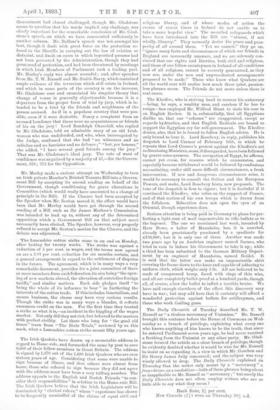The Lancashire cotton strike came to an end on Monday,
after lasting for twenty weeks. The strike was against a reduction of 5 per cent. in. wages, and the terms now agreed on are a 2.91 per cent. reduction for six months certain, and a general arrangement in regard to the settlement of disputes in the future. The agreement, which is in many ways a very remarkable document, provides for a joint committee of three or more members from each federation, its aim being "the open- ing of new markets abroad, the alteration of restrictive foreign tariffs," and similar matters. Each side pledges itself "to bring the whole of its influence to bear" in furthering the interests of the cotton trade. If this includes bimetallism, and means business, the clause may have very curious results. Though the strike was in many ways a blunder, it reflects enormous credit on the men. For the first time they treated a strike as what it is,—an incident in the higgling of the wages market. Not only did they not riot, but behaved to the masters with perfect civility. Let those who long for "the good old times" learn from "The State Trials," reviewed by us this week, what a Lancashire cotton strike meant fifty years ago.


































 Previous page
Previous page